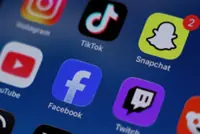MCMC reveals that the country has 26.8 million active social media users, with some exploiting anonymity under the false assumption that their actions are untraceable. — 123rf.com
LAST December, Prime Minister Datuk Seri Anwar Ibrahim became the first person to sign up for MyDigital ID.
The initiative, meant to unify logins for government services, however, was hotly followed by a widely-circulated misconception: that the government will require chips to be inserted into people’s bodies.
“Apparently, people said a SIM card or (computer) chip will be inserted into the body. That’s because they have been watching too many Hollywood movies,” Anwar told reporters on Dec 1.
To address the misconception, Anwar reiterated in a subsequent Facebook post that no such chip would be implanted.
“The claims are baseless, however, the citizens should accept the fact that the country must move forward with current developments, including the use of technology,” he stated.
Additionally, he reassured the public about the safety of their personal information, addressing concerns about potential data breaches.
In Malaysia, the rampant dissemination of tech-related misinformation on social media has become a pressing concern for security experts, including Adil Hidayat Rosli, a content creator who goes by the moniker Pendakwah Teknologi on Facebook and YouTube.
Since the MyDigital ID initiative was announced, Adil Hidayat has come across numerous social media posts and videos created by other users to disseminate misinformation.
“There were those who posted urging others not to sign up for the initiative, claiming that the government would be able to track their movements and their spending through the MyDigital ID,” Adil Hidayat says at an interview in Cyberjaya, Selangor.
Fuelling the fire
In a TikTok video with over 82,000 views, a user claimed that refusal to sign up for MyDigital ID will result in difficulties securing jobs and hinder access to basic necessities like sugar, creating a doomsday narrative around the perceived consequences of the tech initiative.
In another instance, a user made a video featuring a clip of Anwar stating that all ministries and departments must register for MyDigital ID to receive benefits or targeted subsidies.
Though the message itself was not fake, the video, uploaded in November, was accompanied by eerie music. It amassed 750,000 views, and the comments – totalling about 5,000 – were peppered with misinformation.
Some expressed scepticism over the MyDigital ID initiative, alleging that the government is trying to control the people, while one user claimed that it would hinder access to bank savings, and some flatly refused to sign up even if it meant losing out on benefits.
In a statement to LifestyleTech, the Malaysian Communications and Multimedia Commission (MCMC) says all government agencies and ministries are responsible for detecting and monitoring the spread of fake news involving matters under their respective purview.
“Furthermore, the ministries and agencies are also responsible for issuing public statements explaining, clarifying, or refuting any false or misleading news,” it adds.
The regulatory body says it has published a total of 18 articles through its Sebenarnya.my portal since its inception in 2017 on tech-related misinformation that has gone viral online.
As a tech-focused content creator with over 56,000 followers, Adil Hidayat has posted various types of content, including videos, to address concerns about the MyDigital ID initiative.
“I shared how I reached out to Mimos (the Malaysian Institute of Microelectronic Systems, the agency tasked by Anwar to develop the system) to get the facts.
“I explained how it’s just a single sign-on method meant to help verify a user’s identity when they log into government portals. I even explained that the system doesn’t store any data,” he says.
Adil Hidayat signed up for the MyDigital ID via one of the kiosks in the Klang Valley, joking that he got a chip implanted on his chin.
“I wanted to show the sceptical and doubtful users that the initiative is simple. After signing up, you can download the MyDigital ID app to use the ID and scan to sign in to government websites,” he says.
Despite some users expressing gratitude, Adil Hidayat faced backlash from others who dismissed his explanations.
“They accused me of being a pro-government cybertrooper. They will counter my explanations by looking up stories on other websites.
“Whether it’s credible or not, it doesn’t matter because they just need to find a small detail that will help them create a certain context to support their claim.
“They will ignore the other, more relevant details,” he says, adding that he doesn’t receive any incentive from the government to share information about MyDigital ID.
Another technology that often comes under attack by misinformation, both locally and overseas, is 5G, the next-generation wireless network.
In October last year, a video went viral on Facebook, alleging that Malaysia violated international laws by installing 5G towers with high frequencies capable of causing cancer.
MCMC, along with other government agencies, released a video to debunk the claims and remind users not to spread fake news.
Arson attacks, protests, and vandalism against 5G infrastructure occurred globally, with incidents in the United Kingdom, Australia, Canada, and the Netherlands.
Adil Hidayat says he has attempted to explain to users on Facebook that claims about 5G are based on unfounded research.
“I presented the facts and even explained how some of their claims were wrong. However, there are a lot of people who still believe that 5G is dangerous due to what they have seen on social media, and I feel it’s a problem that we as a society can’t overlook,” he says.
Decoding deception
Dr Joanne Lim, deputy dean and associate professor of media, communications and cultural studies at the University of Nottingham Malaysia, said that when a lie is repeated frequently, it has the potential to be perceived as “truth” by some individuals.
“Ideas manifest the same way, regardless of whether they are founded or unfounded – when retold, reshared, or reposted, they become accepted and possibly even regarded as common knowledge depending on their reachability and who endorses them,” she says.
In the digital age where users turn to social media for information, Lim says they are likely to subscribe to certain beliefs or conspiracy theories due to their own lack of understanding about the topic.
She says people’s lack of information about the purpose of the MyDigital ID initiative, including details on its ownership and safety measures, may have led to fear and speculation.
As such, people feel the need to anchor their thoughts onto any information they can grasp, she adds.If left unchecked, Lim says conspiracy theories can erode trust in those who seek to implement changes.
“Conspiracy theories garner support primarily because there is no counter perspective that is deemed to be more trustworthy.
"The lack of clarity and in-depth information will drive people to concoct their own understanding of the matter. If left vague and confusing, tech initiatives will struggle to succeed,” she says.
MCMC reveals that the country has 26.8 million active social media users, with some exploiting the anonymity offered by these platforms under the false assumption that their actions are untraceable when using fake identities.
As some conspiracy theories may have components of false information and promote hate speech, MCMC says there are legal remedies for addressing the issue, including the Communications and Multimedia Act 1998 (CMA 1998).
“The Act provides for content regulation, focusing on preventing the dissemination of offensive and harmful content and the spread of hate speech and disinformation that may disrupt public order,” it adds.
Scepticism around an initiative like MyDigital ID could also be fuelled by past incidents linked to the government’s handling of personal data protection.
Lim cites the MySejahtera data breach, in which a “super admin” account was used allegedly to download the personal information of three million Covid-19 vaccine recipients, as an example.
The incident, revealed in the Auditor-General 2021 report tabled in Parliament last year, is reported to have taken place between Oct 28 and Oct 31, 2021.
“This may have led people to be more protective of their rights and privacy to ensure that their personal data is not exploited and/or used to control, police and manipulate them,” she says.
She adds that the failure of relevant bodies and tech firms to ensure a “high level of data protection” is in place prior to implementing a digital initiative has created mistrust among society and a sense that “we are not ready to embrace it as a nation”.
Valid voices
However, Adil Hidayat says it’s understandable for people to have doubts about new initiatives or programmes.
“I agree if they have concerns about cybersecurity or if they are unclear about the purpose.They deserve to get answers for these questions,” he says, adding that he has also been critical of the government due to many alleged data breaches involving its agencies.
Adil Hidayat feels the way some government agencies communicate their initiatives is also lacking.
“For example, they will only say the MyDigital initiative is useful for you. Compare that to those who are against such initiatives.
“They will go to seemingly desperate lengths to explain why they think it’s dangerous or harmful.
“They can be engaging storytellers who deliver their points passionately,” he adds.For Lim, it’s crucial to not rubbish or trivialise the concerns that users have, as this could fuel distrust and suspicion.
“Instead, reframe the narrative and present information with clarity, depth and precision. Keep it factual rather than personal.For example, attacking one’s religious or personal beliefs will worsen the situation,” she says.
She adds that transparency is key when it comes to implementing or introducing any digitalisation measures, recommending a more consultative and participatory approach that involves the viewpoints of the rakyat.
“Conduct a nationwide study to identify concerns and doubts before making a decision. Such actions could serve to assure the public that digitalisation efforts such as MyDigital ID are initiated not just for the rakyat but with the involvement of the rakyat,” she says.
Lim adds that it’s also important to keep engaging people in a more meaningful manner.
“Once implemented, continue sharing information through various platforms to quell any uncertainties or concerns – understand the sentiments and address them immediately with relevant facts or information,” she says.
Based on his engagement with social media users on Facebook, Adil Hidayat feels that Malaysians are a curious bunch who are very interested in finding out more about the latest technology, including artificial intelligence (AI).
“But they can’t seem to figure out how to verify information, and they tend to believe some social media posts wholeheartedly,” he adds.
Adil Hidayat hopes more experts and tech-savvy users will join the movement to debunk misinformation on social media platforms.
“If you see something that is not right, say something. It may be hard to change other people’s perceptions, but we should make the effort. Otherwise, misinformation will keep on spreading,” he says.










